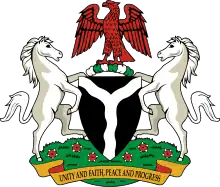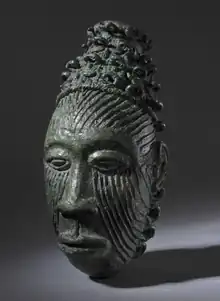ndi Igbo Juu | |
|---|---|
 Igbo Jewish Community presented with a plaque by Black Hebrew Israelite Howshua Amariel. | |
| Total population | |
| 12,000-15,000 practicing mainstream Judaism[1] | |
| Regions with significant populations | |
| Languages | |
| Igbo; Hebrew as a liturgical language | |
| Religion | |
| Igbo form of Judaism | |
| Related ethnic groups | |
| Igbo |
| This article is part of a series in |
| Culture of Nigeria |
|---|
 |
| Part of a series on |
| Igbo people |
|---|
 |
| Subgroups |
| Igbo culture |
| Diaspora |
| Languages and dialects |
| Politics (History) |
| Geography |
Igbo Jews are members of the Igbo people of Nigeria who practice Judaism.
Jewish life has been documented in parts of Nigeria since the precolonial period, but it is not known for the Igbo to have claimed Israelite descent or practiced Judaism in precolonial times.[2][3][4][5][6] During and after the Biafran war (1967-1970), more widespread Igbo identification with Jews concretized.[7]
No formal census has been taken in the region and the precise number of Igbo in Nigeria who practice Judaism is not known. An estimated 30,000 Igbos, having at least 26 synagogues of various sizes, were said to be practicing some form of Judaism in 2008.[8] In 2021 there were said to be approximately 12,000-15,000 mainstream Igbo Jews in Nigeria, comprising some 70 active communities.[9] A more conservative figure of at least 2,000-3,000 Igbo practicing Judaism,[10] and at most 5,000,[11] has also been given.
Historical scrutiny
An early and widely influential statement from Olaudah Equiano, a Christian-educated Igbo man and freed slave, suggested a Jewish migratory origin for the Igbo. He speculated in his autobiography of 1789 on
the strong analogy which ... appears to prevail in the manners and customs of my countrymen and those of the Jews, before they reached the Land of Promise, and particularly the patriarchs while they were yet in that pastoral state which is described in Genesis—an analogy, which alone would induce me to think that the one people had sprung from the other.[12]
Critical historians have reviewed the literature on West Africa that was published during the nineteenth and early twentieth centuries. They have clarified the diverse functions that such histories served for the writers who proposed them at various times in the colonial and post-colonial past.[13][14]
Though there is no doubt that Jews were present in Saharan trade centers during the first millennium AD,[15] there is no evidence that Igbo people had contemporaneous contact with historical Jewish populations, or that they had at any point adopted or practiced Judaism prior to colonization by the European powers.[16][4][17]
Religious practices
The religious practices of the Igbo Jews include circumcision eight days after the birth of a male child, the observance of kosher dietary laws, the separation of men and women during menstruation, the wearing of the tallit and kippah, and the celebration of holidays such as Rosh Hashanah, Yom Kippur, Hanukkah,[18] and Purim.[19]
Contemporary outreach
Certain Nigerian communities with Judaic practices have received help from individual Israelis and American Jews who work in Nigeria, outreach organizations like the American Kulanu, and African-American Jewish communities in America.
| Part of a series on |
| Jews and Judaism |
|---|
|
Rabbi Howard Gorin visited the community in 2006[20] and members of his synagogue, "Tikvat Israel" in Rockville, Maryland, USA, supported those in Nigeria by sending books, computers, and religious articles.[21]
In addition to Rabbi Howard Gorin, visitors have included Dr. Daniel Lis, Professor William F. S. Miles, filmmaker Jeff L. Lieberman, and the American writer Shai Afsai.[22]
In 2013 Shai Afsai invited two Igbo Jewish leaders, Elder Ovadiah Agbai and Prince Azuka (Pinchas) Ogbukaa of Abuja's Gihon Hebrew Synagogue, to Rhode Island in the United States.[23] The visit of the two men led Rabbi Barry Dolinger of Rhode Island to go to Nigeria with Afsai in 2014.[24]
A main concern of Igbo Jews has been how to be part of the wider Jewish world.[25] According to Elder Pinchas (Azuka) Ogbukaa, spokesman of Abuja's Gihon Synagogue, the "greatest of all the challenges we are facing is that of isolation."[26]
Igbo Jews in Israel
Over the past few decades, several Igbo have immigrated to Israel, particularly to Tel Aviv. This wave of immigration can partially be explained by a small diaspora that was established in Israel when Nigeria was granted independence in 1960.[27] This is partially due to comprehensive educational programs that the Israelis implemented in the new Nigerian state after the 1960s, programs that familiarized many people with the idea of Israel as a modern nation state for the first time, and the possible opportunities that existed for Jewish people who lived there.[4]
The Igbo Jewish community is not recognized as a Jewish community for the purpose of immigration to Israel by Israel's Supreme Court. Additionally, none of the mainstream denominations of Judaism consider the group an authentically Jewish community. Indeed, while they identify themselves as being a part of the worldwide Jewish community, they are still struggling to be recognized as Jews by other Jews.[28] An affiliate of Gihon Hebrews' Synagogue expressed this struggle to Shai Afsai in Abuja: "We say we are Jews from blood. We are now excluded; we cannot go and participate as Jews in any place. I make an appeal that we be recognized, not excluded and isolated from other Jews."[29]
However, some Igbo Jews are currently adopting more rigorous religious customs, in order to gain more acceptance from the mainstream Jewish community. For instance, Daniel Lis explained in his article[4] that parts of the Igbo Jewish community are assimilating themselves to the standards of Orthodox Judaism, so as to be universally accepted as Jews in Israel.
While Igbo Jews claim that they are the descendants of the ancient Israelites, others say they lack the historical evidence which would prove their descent from such a community,[27][17] and they also lack evidence of a continuous practice of Judaism which should predate colonial contact.[4] Frustrating the possibility that the state might make such a determination, and frustrating the possibility that a Jewish denomination might recognize the entire community as an authentically Jewish one is the fact that some Igbo Jews simultaneously claim to be Christians, calling their commitment to Judaism and their claim to have a Jewish identity into question. Among them are a number of Igbo who have illegally immigrated to Israel by simultaneously claiming to be Jews and Christians. According to the official administration of Israel, a number of Igbo were granted the right to travel in Israel for the purposes of Christian pilgrimage, but they have overstayed their visas, and now they are illegally living and working in the country.[27]
The State of Israel has made no official recommendations as to whether the Igbo Jews constitute a legally recognizable Jewish community for the purposes of immigration to Israel, nor is their legal status currently being debated at any level within the state.[27] However, several Igbo Jews who have undergone formal conversions to Orthodox or Conservative Judaism have been accepted as Jews on an individual basis under the Law of Return, and they have also immigrated to Israel.
See also
References
- ↑ "Nigerian Igbo Jewish leader arrested with Israeli visitors freed". BBC News. 2021-08-09. Retrieved 2023-08-20.
- ↑ Chuku, Gloria (2018). "Igbo historiography: Parts I, II, and III" (PDF). History Compass. 16 (10): 7–14. doi:10.1111/hic3.12489. hdl:11603/11290. S2CID 149489328. Retrieved 15 August 2018.
- ↑ Ezedu, F. (2013). "Science Education and Challenges of Globalization in Igbo Nation" (PDF). Us-China Education Review. B, Education Theory. David Publishing, University of Nigeria, Nsukka, Nigeria: 118. ISSN 2161-6248. Retrieved 30 September 2020.
- 1 2 3 4 5 Lis, Daniel (2009). "'Ethiopia shall soon stretch out her hands': Ethiopian Jewry and Igbo Identity". Jewish Culture and History. 11 (3): 21–38. doi:10.1080/1462169X.2009.10512134. S2CID 162372846.
- ↑ Afigbo, Afigbo (1981). Ropes of Sand Studies in Igbo History and Culture University PressAfrica World Press.
- ↑ Lis, Daniel (2015). Identity among the Igbo of Nigeria. Africa World Press.
- ↑ Afsai, Shai (2016). "Nigeria's Igbo Jews: Jewish identity and practice in Abuja". Anthropology Today. 32 (2): 14–17, back cover. doi:10.1111/1467-8322.12239.
- ↑ Bruder, Edith (2008). The Black Jews of Africa: History, Religion, Identity. Oxford University Press. p. 143. ISBN 978-0195333565.
- ↑ "Nigerian Igbo Jewish leader arrested with Israeli visitors freed". BBC News. 2021-08-09. Retrieved 2023-08-20.
- ↑ Afsai, Shai, "R.I. visit builds bridge with Nigeria's Igbo Jews", The Providence Journal, 15 December 2013.
- ↑ Afsai, Shai (2016). "Nigeria's Igbo Jews: Jewish identity and practice in Abuja". Anthropology Today. 32 (2): 14–17, back cover. doi:10.1111/1467-8322.12239.
- ↑ Equiano, Olaudah (2005). The Interesting Narrative of the Life of Olaudah Equiano, Or Gustavus Vassa, the African Written By Himself. EBook #15399.
- ↑ Sanders, Edith (1963). "The Hamitic Hypothesis: Its Origin and Functions in Time Perspective". Journal of African History. 10 (4): 521–532. doi:10.1017/S0021853700009683. JSTOR 179896. S2CID 162920355.
- ↑ Zachernuk, Philip (1994). "Of Origins and Colonial Order: Southern Nigerians and the 'Hamitic Hypothesis' c. 1870–1970". Journal of African History. 35 (3): 427–55. doi:10.1017/s0021853700026785. JSTOR 182643. S2CID 162548206.
- ↑ Hunwick, John (1985). "Al-Mahili and the Jews of Tuwat: The Demise of a Community". Studia Islamica. 61 (61): 155–183. doi:10.2307/1595412. JSTOR 1595412.
- ↑ Ezedu, F (2013). "Science Education and Challenges of Globalization in Igbo Nation" (PDF). Us-China Education Review. B, Education Theory. David Publishing, University of Nigeria, Nsukka, Nigeria: 118. ISSN 2161-6248. Retrieved 30 September 2020.
- 1 2 Chuku, Gloria (2018). "Igbo historiography: Parts I, II, and III" (PDF). History Compass. 16 (10): 7–14. doi:10.1111/hic3.12489. hdl:11603/11290. S2CID 149489328. Retrieved 15 August 2018.
- ↑ Miles, William F. S., "Among the Igbos of Nigeria During the Festival of Lights" Archived 2017-09-04 at the Wayback Machine, 2011.
- ↑ Afsai, Shai, "Hanging Haman with the Igbo Jews of Abuja", The Times of Israel, 30 April 2013.
- ↑ "Rabbi Returns to Nigeria for 3-Week Mission" Archived 2007-09-30 at the Wayback Machine, Tikvat Israel Congregation (Rockville, Maryland), 13 February 2006.
- ↑ "Tikvat Israel ships scripture to Nigeria" Archived 2007-09-30 at the Wayback Machine, Tikvat Israel Congregation (Rockville, Maryland), 11 January 2006.
- ↑ Afsai, Shai, "Igbo Jews Of Nigeria Study And Practice Judaism", Jewish Link, 9 August 2013.
- ↑ Maliki, Anthony, "Igbo Jews to host leading American Jew", Daily Trust, 18 February 2014.
- ↑ Afsai, Shai, "R.I. rabbi’s visit to Nigeria helps lessen its Jewish community's isolation, Providence Journal, 16 November 2014.
- ↑ Maliki, Anthony, "Igbo Jews to host leading American Jew", Daily Trust, 18 February 2014.
- ↑ Afsai, Shai, "Abuja’s Igbo Jews pay a visit to Rhode Island", The Jerusalem Post, 23 October 2013.
- 1 2 3 4 Lis, Daniel (2015). Identity among the Igbo of Nigeria. Africa World Press.
- ↑ Afsai, Shai (2016). "Nigeria's Igbo Jews: Jewish identity and practice in Abuja". Anthropology Today. 32 (2): 14–17, back cover. doi:10.1111/1467-8322.12239.
- ↑ Afsai, Shai (2016). "Nigeria's Igbo Jews: Jewish identity and practice in Abuja". Anthropology Today. 32 (2): 14–17, back cover. doi:10.1111/1467-8322.12239.